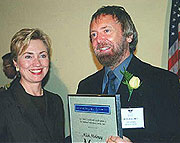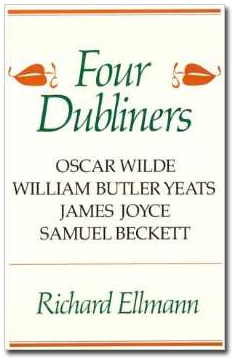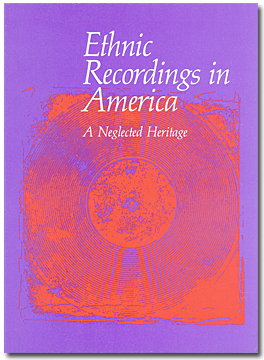 Every year since 1991, the President of the United States has issued a proclamation declaring the month of March to be Irish-American Heritage Month, honoring the contributions of Irish immigrants and their descendants to American life and culture.
Every year since 1991, the President of the United States has issued a proclamation declaring the month of March to be Irish-American Heritage Month, honoring the contributions of Irish immigrants and their descendants to American life and culture.
Here are just a few government publications to help you celebrate Irish-American culture today and throughout the month of March:
Literature
 Four Dubliners—Wilde, Yeats, Joyce, and Beckett: Richard Ellmann was a widely-respected American literary critic who wrote important biographies of several Irish authors. In 1982, he gave a series of lectures at the Library of Congress discussing the lives and careers of four of Ireland’s most important authors: Oscar Wilde, William Butler Yeats, James Joyce, and Samuel Beckett. The lectures were originally published separately in four tiny books, and then in 1986 they were revised and brought together in this collection, which also points out some intriguing connections among these authors. Audio recordings of the original lectures are available at the Library of Congress.
Four Dubliners—Wilde, Yeats, Joyce, and Beckett: Richard Ellmann was a widely-respected American literary critic who wrote important biographies of several Irish authors. In 1982, he gave a series of lectures at the Library of Congress discussing the lives and careers of four of Ireland’s most important authors: Oscar Wilde, William Butler Yeats, James Joyce, and Samuel Beckett. The lectures were originally published separately in four tiny books, and then in 1986 they were revised and brought together in this collection, which also points out some intriguing connections among these authors. Audio recordings of the original lectures are available at the Library of Congress.
Music
 “Irish ethnic recordings and the Irish-American imagination,” in Ethnic Recordings in America: A Neglected Heritage: The American Folklife Center was established by Congress in 1976 “to preserve and present American folklife.” Their first major public event was a conference discussing sound recordings of various ethnic musical traditions in the United States. The presentations at that conference became the basis of a 1982 book. Irish-American folklorist and musician Mick Moloney’s chapter on Irish recordings explores several strains of Irish-American music, including works by Irish-American composers trained in the western European classical tradition, vaudeville comedy numbers and similar “stage-Irish” songs, traditional Irish dance tunes, and hybrid forms that combine these strains with traits of American popular music. He also discusses the surge of American interest in Irish folk music during the 1960s and 70s that was stimulated by the popularity of Irish performers such as the Clancy Brothers and Tommy Makem.
“Irish ethnic recordings and the Irish-American imagination,” in Ethnic Recordings in America: A Neglected Heritage: The American Folklife Center was established by Congress in 1976 “to preserve and present American folklife.” Their first major public event was a conference discussing sound recordings of various ethnic musical traditions in the United States. The presentations at that conference became the basis of a 1982 book. Irish-American folklorist and musician Mick Moloney’s chapter on Irish recordings explores several strains of Irish-American music, including works by Irish-American composers trained in the western European classical tradition, vaudeville comedy numbers and similar “stage-Irish” songs, traditional Irish dance tunes, and hybrid forms that combine these strains with traits of American popular music. He also discusses the surge of American interest in Irish folk music during the 1960s and 70s that was stimulated by the popularity of Irish performers such as the Clancy Brothers and Tommy Makem.
If It Wasn’t for the Irish and the Jews: Irish and Jewish Influences on the Music of Vaudeville and Tin Pan Alley: In 2009, Mick Moloney gave an illustrated talk on a largely forgotten, yet highly influential, period in American popular music. This Web site provides a summary of the lecture and a recording of the Webcast.
Irish Tin-Whistle Instruction Books: A Bibliography: The tin-whistle, also known as the penny-whistle, among other names, is inexpensive (although it does cost a bit more than a penny!) and easy to play, making it one of the most popular instruments for playing traditional Irish folk music. This historic reference aid from the American Folklife Center lists several instruction books that were published in the 1970s in Ireland, the United Kingdom, and the United States.
Food
“Whole-Wheat Irish Soda Bread,” from The Eating Well Diabetes Cookbook: This healthy adaptation of a traditional Irish recipe comes from a commercial publication, but is made available online free of charge, courtesy of the U.S. Army Medical Department’s Fox Army Health Center.
Colcannon Soup with Oven-Roasted Kale: This delicious soup recipe, inspired by a traditional Irish dish combining mashed potatoes with cabbage or kale, appears on the Web site of the Defense Commissary Agency (DeCA), which operates a worldwide chain of commissaries that provide groceries to military personnel, retirees, and their families.
Article by Bobby Griffith.
Photo credit: Folklorist and musician Mick Moloney receiving America’s highest honor in the folk and traditional arts, the NEA National Heritage Fellowship, from then First Lady Hillary Clinton in 1999 (American Folklife Center).


